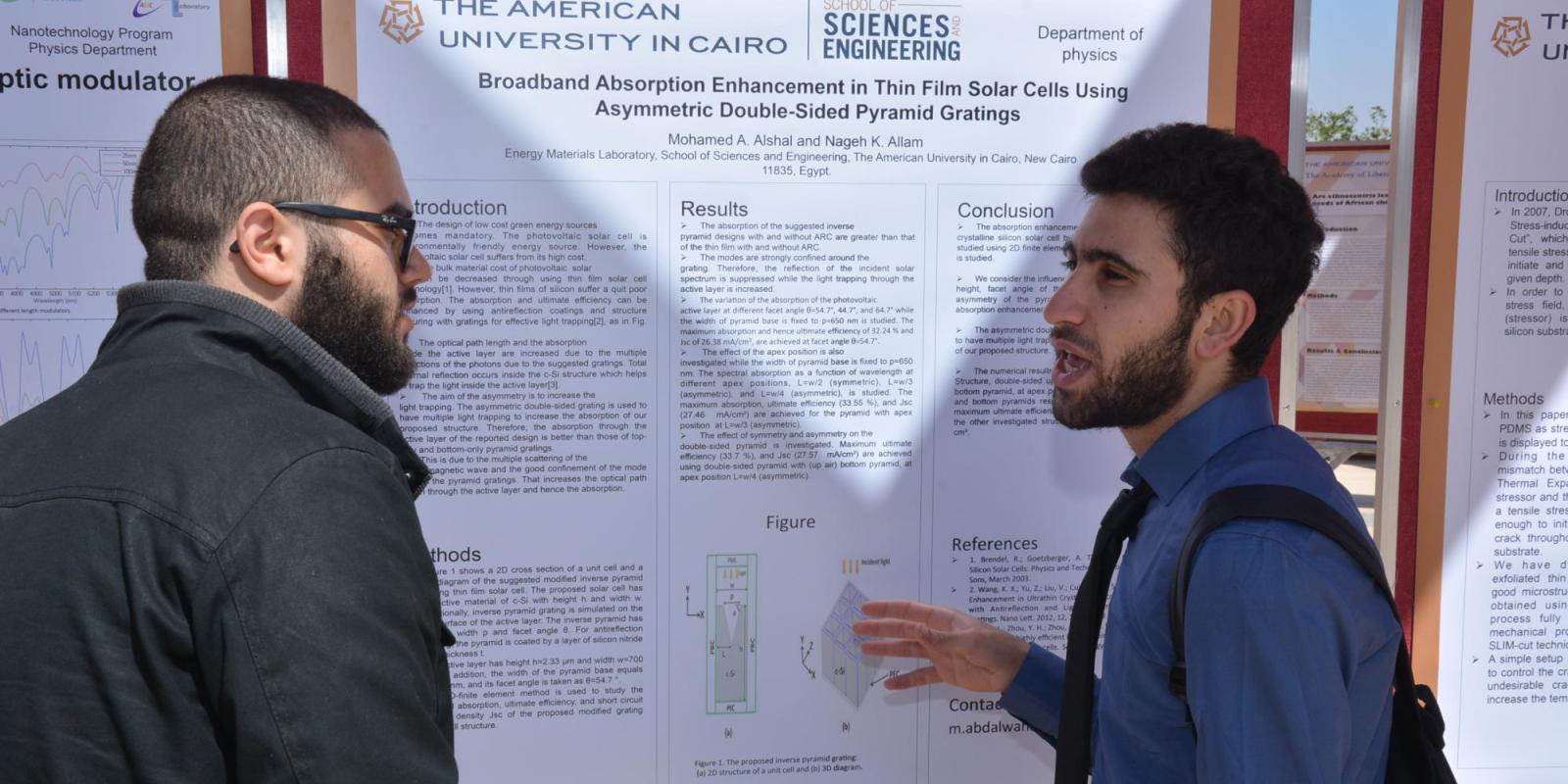
Faculty, Student Winners of the First AUC Research Day
At AUC’s first Research Day, held on March 30, more than 100 students and faculty members presented a diverse array of innovative and creative research taking place at the University.
Fourteen AUC students and seven faculty members were awarded with a cash prize and certificate for the best outstanding research. The awards and closing remarks were given by His Royal Highness Prince Turki Al Faisal, chairman of the King Faisal Center for Research and Islamic Studies.
This year’s winners are:
Undergraduate Students
- “Life Sustaining Yet Lethal: Food,” Omar Gaballa, rhetoric and composition, Academy of Liberal Arts
- “Uber and the Taxi: An Application of ‘Market, Hierarchy and Trust,’" Karen Sameh Fanous, economics; and Rauda Amer, economics; School of Business
- “Institutionalized Expressions: The Law and Art Production in Egypt,” Ingy Higazy, School of Global Affairs and Public Policy
- “Sexual Violence Interpretation Depends on Where It’s Interpreted,” Hadeer El-Ashhab, School of Humanities and Social Sciences
- “Infrastructure Planning and Design, Al Sharabia, North Cairo District,” Yasser M. Khaldi, construction engineering, School of Sciences and Engineering
- “Infrastructure Planning and Design, Al Sharabia, North Cairo District,” Mark H. Sedrak, construction engineering, School of Sciences and Engineering
Graduate Students
- “Culture Contextualization of Mathematics Instruction,” Mariam Makramalla, international and comparative education, Graduate School of Education
- “School and Society: Spaces for Citizenship Construction in Egypt,” Nashwa Moheyeldine, international and comparative education, Graduate School of Education
- “Evaluation of Green Building Rating Systems for Egypt,” Heba Alla Karmany, sustainable development
- “Adapting Methodology to Convert Existing Residential Buildings to Near-Zero-Energy Buildings in Egypt,” Somaya Albadry, sustainable development
- “Is the Central Bank Shadowing Taylor Rule?” Maram Khattab, economics, School of Business
- “Toward a Child-Centered Juvenile Justice System in Egypt,” Manar Mohammad Hafez, public policy and administration, School of Global Affairs and Public Policy
- “The Expression Pattern of miR-590-3p in Epithelial Ovarian Cancer is a Potential Diagnostic Biomarker for Ovarian Cancer,” Heba Shawer, biotechnology, School of Sciences and Engineering
Faculty
1. “Transformational Learning: Identity Insights,” Ghada Elshimi, associate dean of undergraduate studies, Academy of Liberal Arts
2. “Education for Sustainability in Egypt: Participants’ Perspectives,” Heba El Deghaidy, associate professor, Graduate School of Education
3. “Egyptian Arabic Stories Around 1800,” Mark Muehlhaeusler, director, Center of Excellence for the Middle East and Arab Cultures, Libraries and Learning Technologies
4. “Defense Spending and Ethnic Inequality,” Hamid E. Ali, associate professor and chair, Department of Public Policy and Administration, School of Global Affairs and Public Policy
5. “Desalinated Water for Food Production in the Arab Region,” Hani Sewilam, professor of mechanical engineering, School of Sciences and Engineering; director, Center for Sustainable Development
6. “Conditional Cash Transfers for Egypt: How an Idea Becomes a National Program,” Hania Sholkamy, associate research professor, Social Research Center
7. “Corporate Financial Policy in Egypt: Evidence from the Field,” Aliaa Bassiouny, assistant professor of finance and chair, Department of Management, School of Business
Researchers’ Reflections
Urban Infrastructure
The idea of conveying a message in a particular research area is what inspired Yasser M. Khaldi and Mark H. Sedrak to participate at AUC’s Research Day. “Without AUC’s academic facilities and resources we wouldn't have had the opportunity to present at Research Day,” said Khaldi. “As loyal students, we have to give back to the community by sharing diverse, unique research.”
At Research Day, Khaldi and Sedrak introduced engineering solutions to the chronic infrastructure problems that exist in urban slums throughout Egypt. “We designed infrastructure facilities and network designs such as transportation, water and sewage lines for the district of Al Sharabia located North of Cairo,” explained Sedrak. “For the drainage network design, we located points in the district where catch basins can be installed in order to reduce water accumulation in the streets in situations of excessive rain.”
In addition, Khaldi and Sedrak presented a traffic plan and analysis study for the area of Al Sharabia. “In order to provide efficient designs to meet the traffic demand in this district, we forecasted the number of vehicles in different routes,” said Sedrak. “One of the main problems with Egypt’s infrastructure system is that it doesn’t offer alternative ways to access different communities, which is what creates traffic congestion.”
Education
Committed to improve Egypt’s educational system, Mariam Makramalla addressed the importance of modifying Egypt’s educational system with classroom pedagogies that fit with responsive teaching techniques. “I think there is an urgent need to introduce new methods that encourage the process of analytical and critical thinking,” she said. “This research is significant as it offers an alternative way of instruction that is different from the traditional curriculum.”
For Makramalla, winning the competition proved that she was capable of communicating her research to others outside her discipline of study. “I feel incredibly motivated to speak about my research,” she said. “I plan to use the cash prize to fund my participation in the International Education Conference at the Lebanese American University.”
Sustainability
Also looking into development in Egypt, Sewilam presented his research about desalinated water and food production. “With 85 percent of Egypt’s water resources being used to irrigate agriculture, this research is vital because there is water scarcity in the country,” he said. “I presented a unique method to desalinate and produce water for irrigation. I proposed the use of solar energy to produce electricity, which in turn is used to desalinate water and produce irrigated agriculture.”
AUC’s Research Day motivates students and faculty members to be at the same level of commitment and participation, noted Sewilam. “It is research initiatives like this day that are valuable,” he stated. “It encourages faculty members to promote their work after working long nights conducting research. Being part of this experience is an added value to any AUC faculty member because it attracts donors, funds research and shows our community at large that we have produced valuable research that contributes to the sustainable development of Egypt and beyond.”
